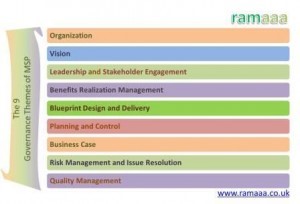MSP Programme Management Governance Themes
What are the MSP programme management governance themes?
There are 9 MSP programme management governance themes according to managing successful programmes manual They are:

- Organization
- Vision
- Leadership and Stakeholder Engagement
- Benefits Realization Management
- Blueprint Design and Delivery
- Planning and Control
- Business Case
- Risk Management and Issue Resolution
- Quality Management
The MSP programme management governance themes provide a control framework for the MSP programme governance. The MSP governance framework is so designed that it provides a transparent, clear and open style of control through which the MSP programme can function while keeping itself within visibility and control of the corporate.
The elements of the MSP programme management governance themes framework help the MSP programme to manage itself effectively while delivering the agreed outcomes and benefits. While working within the MSP programme management governance themes framework, the MSP programme can be at its best in negotiating the resource it needs, managing these when made available, and adjusting its own self to be aligned with the overall corporate strategy at all times. MSP programme management thus depends on the MSP governance themes for success.
How does MSP programme management governance relate to the organisational governance?
The MSP governance framework that the MSP programme management governance themes provide must be integrated within the governance control framework of the overall organisation. And, more interestingly, the MSP programme management can make use of the elements of the organisational level governance framework where these can provide the necessary control, structure and visibility for the MSP programme itself.
It is very important that any MSP programme management framework provided by the MSP programme management governance themes integrates with the overall control framework at the organisational level. There should be effort from both the MSP programme and the higher level organisation to make this happen as such integration benefits both. It is important that the organisation really understand the MSP programme well and is able to see it well. Such visibility will enhance the success of the programme and the organisation. The organisation should also have a good understanding of how the MSP programme relates to other programmes within the organisation and the outside world. In the same way, programmes must take all proper care to operate well within the control framework of the organisation. They should make themselves visible and allow the organisation to control them as necessary. Such programmes can gain the much needed trust and buy-in of the organisation.
How do MSP programme management governance themes relate to the MSP transformational flow?
The MSP programme management governance themes provide the much needed guidance and useful tools to the MSP Transformation Flow activities. The relation between the MSP programme management governance themes and the MSP transformation flow activities is multi-fold. One or more MSP programme management governance themes can influence one or more MSP transformation flow activities.
The MSP programme management governance themes will have great influence on MSP programme management from Start to Finish. They are not adhoc or one-time elements of MSP programme management. Their influence is spread all over a programme’s life-cycle.
What are MSP programme management strategies?
An MSP programme typically defines a number of strategies and plans that explain how the programme would achieve the desired results. The strategies cover the overall approach of the programme regarding process, content and ownership etc. of various aspects around a particular MSP governance theme. A general guideline is that a particular strategy of a MSP programme is derived from and in agreement with the organisational strategy or policy for that MSP governance theme. The factors that should be in alignment are things like ownership, units of measurement and reporting intervals etc. The plans cover more detail than strategies and they explain the detailed activities involved with a strategy, their ownership, responsibilities, timelines etc.
Once the MSP programme’s strategies and plans are formulated, it is important that the organisation and the MSP programme agree upon them. They must validate, sign-off and endorse such MSP strategies and MSP plans. With this, the organisation can make sure that it has proper visibility and control of the MSP programme and the MSP programme can make sure that it has the right level of ownership, visibility and control and detail for any MSP governance theme.
What are common examples of MSP programme management strategies?
The below are few examples of MSP programme management strategies and the delivery mechanisms.
Resource Management: This MSP programme management strategy covers all resources that would be needed by the programme. This includes financial resources, human resources, non-human resources, logistics etc. that the MSP programme needs to achieve its objectives as desired. The MSP programme typically implements this strategy by a Resource Management Plan.
Monitoring and Control: This MSP programme management strategy covers the detail that explains how the MSP programme would monitor the progress of the programme and can exercise control on the same. This involves comparison of expected and actual results from time to time in various areas such as outcomes, cost, scope, quality, key milestones etc. The MSP programme typically implements this strategy by a Programme Plan.
Information Management: This MSP programme management strategy covers how the MSP programme would create and manage the information. It explains how MSP programme would classify, store, retrieve and distribute information as part of the programme. The MSP programme typically implements this strategy by an Information Management Plan.
Quality Management: This MSP programme management strategy covers how the MSP programme would define, plan and meet the quality requirements. The MSP programme typically implements this strategy by a Quality Management Plan.
Risk Management: This MSP programme management strategy covers how the MSP programme would identify, analyse, quantify, qualify and address various risks that may impact the MSP programme. The MSP programme typically implements this strategy by a Risk Register.
Issue Resolution: This MSP programme management strategy covers how the MSP programme would manage various issues within the programme in such a way that the programme runs as smoothly as is needed. The MSP programme typically implements this strategy by an Issue Log.
Stakeholder Engagement: This MSP programme management strategy covers how the MSP programme would establish how the MSP programme would deal with various stakeholders. This includes how stakeholders are identified, analysed, understood and engaged. The interests of stakeholders and the influence they can have on the programme play a very important role. The MSP programme typically implements this strategy by Stakeholder profiles and MSP programme communication plan.
Benefits Management: This MSP programme management strategy covers how the MSP programme would make sure it delivers the desired benefits to the organisation. MSP programme typically implements this strategy by the Benefits Realisation plan.
What is the relationship between MSP governance themes and MSP transformational flow?
In practice, the MSP governance themes and the MSP transformation flow activities interact with each other very closely. The managing successful programmes manual defines this relationship in the below words ‘If the Transformation Flow is the MSP programme’s time based to-do list, the MSP governance themes can be seen as the reference manual. If the MSP transformation flow requires action, then the MSP governance themes should provide guidance on how it should be done. The interactions that need to happen between MSP governance themes and MSP transformation flow activities should be built in to all the process models in the MSP programme.
What are the roles and responsibilities involved in MSP programme management governance?
The roles and responsibilities involved in MSP programme management governance are as below:
The MSP Senior Responsible Owner (SRO) has the overall accountability and responsibility for the design and approval of, and compliance of the programme with corporate controls, governance strategies and initiations of assurance reviews.
The Programme Manger has the responsibility for the design and implementation of the programme governance strategies, consultation with corporate governance, stakeholder consultation and supporting the SRO in implementation and control.
The Business Change Manager has the responsibility of review and contribution to governance development, implementation of governance arrangements where they impact on operations, input to programme assurance reviews, initiating assurance reviews of business operational areas and specific focus on benefits and stakeholder governance.
MSP Programme Management Governance Themes | Ramaaa Consultants Limited | Manoj Gajavelli MSP | Experts in MSP Programme Management | Specialists in Training and Consulting.
